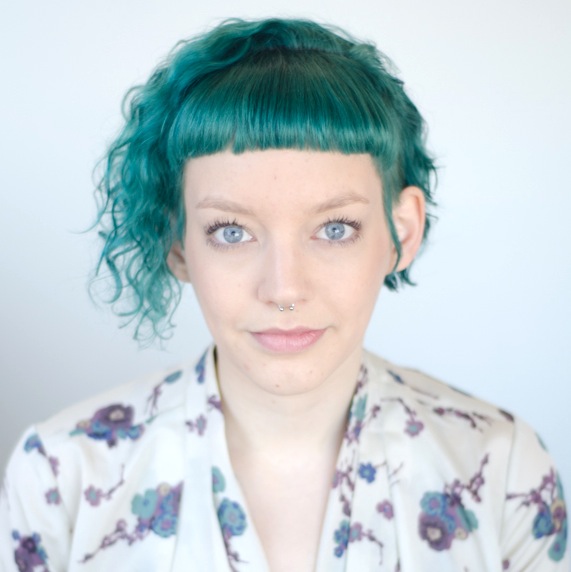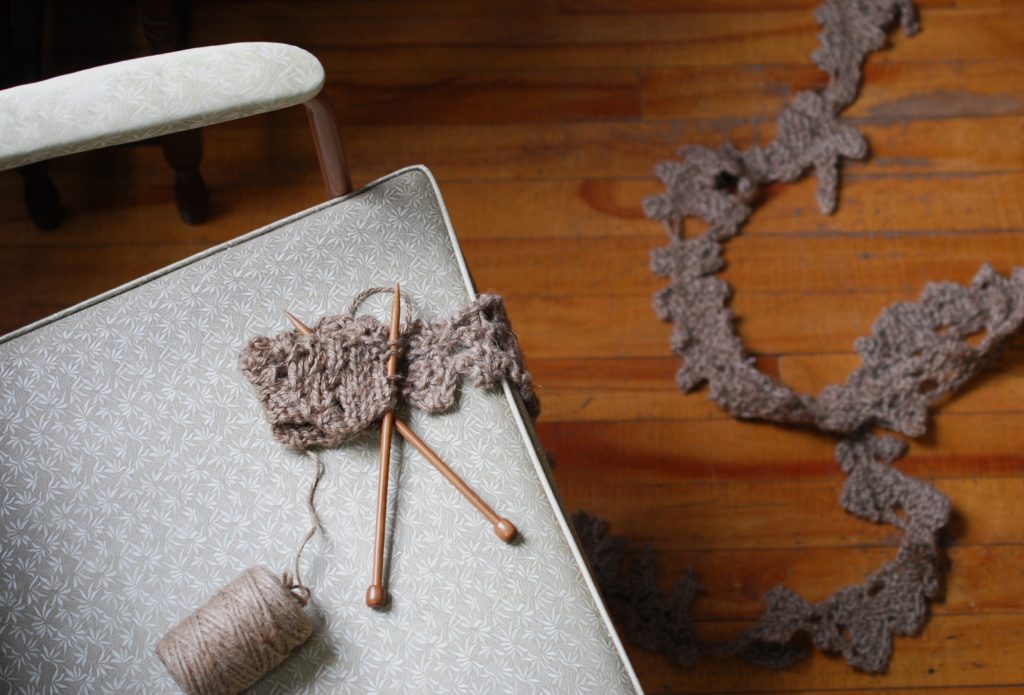
Interview by Kyla Jamieson.
Get to Know is a new PRISM interview series dedicated to introducing you to our favourite writers and contributors by way of a range of questions that touch on quotidian details, public spaces, risk-taking, and advice for young writers. This week it’s our pleasure to introduce you to Jessica Bebenek (@notyrmuse), a writer and transdisciplinary artist currently pursuing an MA at Concordia University in Montreal. Her non-fiction piece “For J” appeared in PRISM’s Spring 2017 issue after being shortlisted for our Non-Fiction Contest; this piece is part of Writing for Men, a non-fiction collection she’s currently working on.
Bebenek’s poetry chapbook Fourth Walk was released this Spring by Desert Pets Press, and she is currently completing her first full collection of lyric poetry, No One Knows Us Here. This Fall, the knitted tapestries in Bebenek’s k2tog series, which explore how women speak to each other through both ‘art’ and ‘craft,’ will be displayed at The Gladstone’s Hard Twist exhibition, alongside the launch of her accompanying chapbook of knitting patterns (k2tog), forthcoming from Berlin’s Broken Dimanche Press. You can find further info on publications and readings on Bebenek’s website.
1. What’s happening around you—either right around you or outside of where you are?
I’m writing in my big, bright kitchen, sipping coffee and snacking on some freshly-baked lemon-lavender scones. Just a regular Thursday morning…I wish. I’m working as a nanny this summer and the family I work for is on vacation. So for two weeks, every morning is a Sunday morning.
I’m especially loving being home lately because I recently inherited a ton of family antiques. Being surrounded by things from my childhood, these objects that hold my history, is so inspiring. Even right now, I’m typing sitting at the table where my grandmother ate her breakfast as a little girl, sipping coffee from a mug that my grandparents used when entertaining. Even my cats eat out of antique bowls that my mother collected!
2. Why do you live where you live?
I moved to Montreal two years ago to do my master’s degree in English & Creative Writing at Concordia. I thought I’d just be staying here until I finished my degree and then moving back to Toronto, but as things stand, I could see myself living here for quite a while. The main reason is that rent here costs less than half as much as it does in Toronto, meaning that I’m a professional poet who lives on her own in a nice neighbourhood, in a top-floor apartment with skylights and two balconies. It’s bonkers.
The downside is that I really miss Toronto, my friends and the thriving writing community. Montreal can feel like a small town in comparison—the anglophone writing community is a small section of a writing community that’s already smaller than Toronto’s, in a city that is likewise smaller. And because it can be tough for anglos to find work, people are constantly coming and going. But on the flip side, Toronto is close enough that I can visit whenever I like (s/o to my friends who put up with me crashing on their couches every month!).
3. What are you looking forward to this week?
Going on a date-not-date with my crush. We’re in the perfect part of the infatuation right now where neither of us knows that the other likes them. We’re not close enough yet to see each other’s flaws, and that makes us perfect, a shiny fantasy. I’m in love with everything I think she is and everything she sees in me.
4. What advice would you give a young writer?
I know that you have a lot of feelings and that you need to write them down, that there is no ethical consumption under capitalism, etc. But we all gotta eat. Get yourself a job where you can work as few hours as possible for as much pay as possible. In my experience, bartending has been great for this. Don’t listen to people who tell you that where you make your money is your career. If you believe in your writing, then that’s your career, and the place where you make money is your job. You’ll have to work very hard for a long time, probably your whole life, but if it’s what you truly want to be doing, then it will be a joy to do that work. (But not always. Don’t let this stop you.) Don’t ever commit to things that make you unhappy. Follow your heart. Touch something green every day.
Find yourself a supportive writing community who feel as passionately as you do—not just people who are trying to ‘network.’ Don’t change yourself to try to impress the people who are in power. Write exactly what you need to write. By the time you are very strong, they will be gone and you will be the one with power. Don’t ever forget what it felt like to be weak and alone.
5. What’s your morning routine?
My kitten, Aleister Crowley, has taken to aggressively snuggling with my head to wake me up at eight a.m. every day. This is both extremely annoying and extremely cute, truly earning him his title of The Wickedest Kitten in the World. I love starting my day with coffee and reading. I’ve found that reading first thing in the morning gets my brain firing for the rest of the day, and usually inspires me to start writing. Suddenly, I’m a morning person.
6. What are you most proud of?
I’ve realized that having a wealth of empathy can be a great power. For years, I opened myself too much to other people, took on their problems as my own and struggled to change things that were impossible for me to change. I couldn’t figure out where to draw the line between ‘being open’ and ‘being too much.’ In recent years, I’ve drawn into myself more, and I’m slowly learning how to unfurl again safely, with self-confidence. I’m learning to extend my empathy towards non-human life, and coming to understand our shared world through this new lens has been so enlightening. I’m working towards understanding our world more every day, trying to live my life with empathy as a guiding force.
7. Do you have any “vices”? What’s the relationship between your vices and your writing?
For years, I thought my vice was crafting—I’ve spent countless hours on bookbinding, embroidery, knitting, cross stitch, decorating, etc. But eventually I realized that, as with all things we spend our lives staring into, there’s more at stake than there seems to be at first glance. Plus, now I can feel at least a little less guilty about all of those hours spent not-writing.
When I lived in Toronto, I founded a micro-press, Grow & Grow, publishing poetry chapbooks. I also had an Etsy shop, Live Equal Arts, where I sold the chapbooks and made custom journals, specifically using upcycled or reclaimed materials. Once I’m finished with my thesis work, I’d love to reopen the shop!
Speaking of, I’ve finally found a way to incorporate my knitting obsession into my writing. While my publications tend towards lyric poetry, I also have a fascination with form and lyric conceptualism. For my graduate thesis, I’m transforming T.S. Eliot’s “The Waste Land” into a knitted tapestry, critiquing the exclusivity of Male Modernism through the public performance of ‘women’s craft.’ I’ll be writing a formal knitting pattern for the more than 500 line poem (which I hope to publish!) and I’ll be performing the knitting of the tapestry over the course of twelve hours at Toronto’s Nuit Blanche this year, overnight on September 30.
 8. What’s one risk you’re glad you took?
8. What’s one risk you’re glad you took?
Falling in love, romantically and in friendship. I believe it’s always, always worth the risk.
9. Is there a public space you’re fond of? Describe it.
The village of Holmfirth in West Yorkshire, England. It’s a tiny village in the North of England where my Nan lives. While I’ve only visited Holmfirth a few times in my life, it somehow feels like where I’m from. I feel at home and at peace when I’m there, and I hope to live there one day.